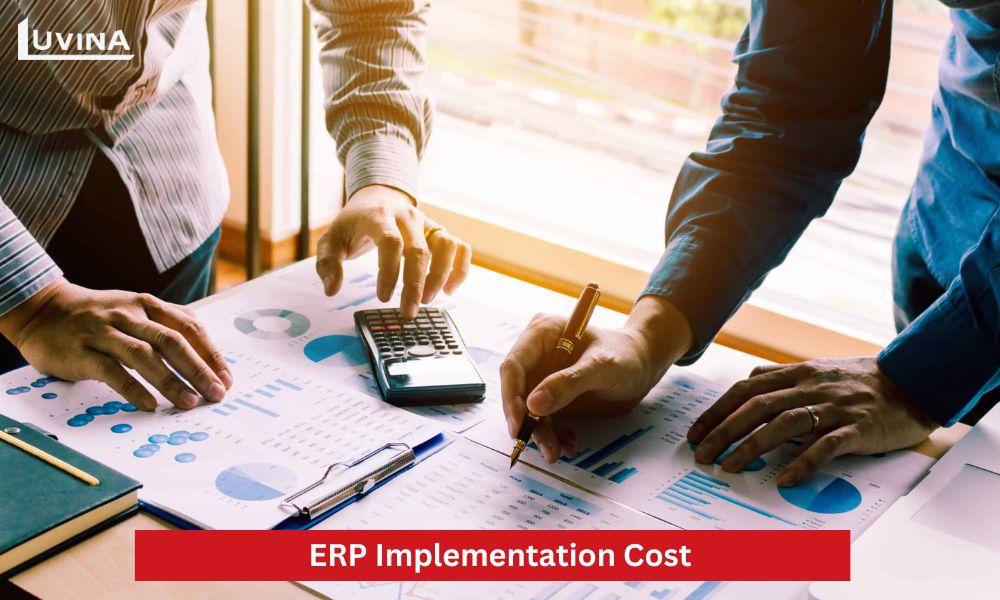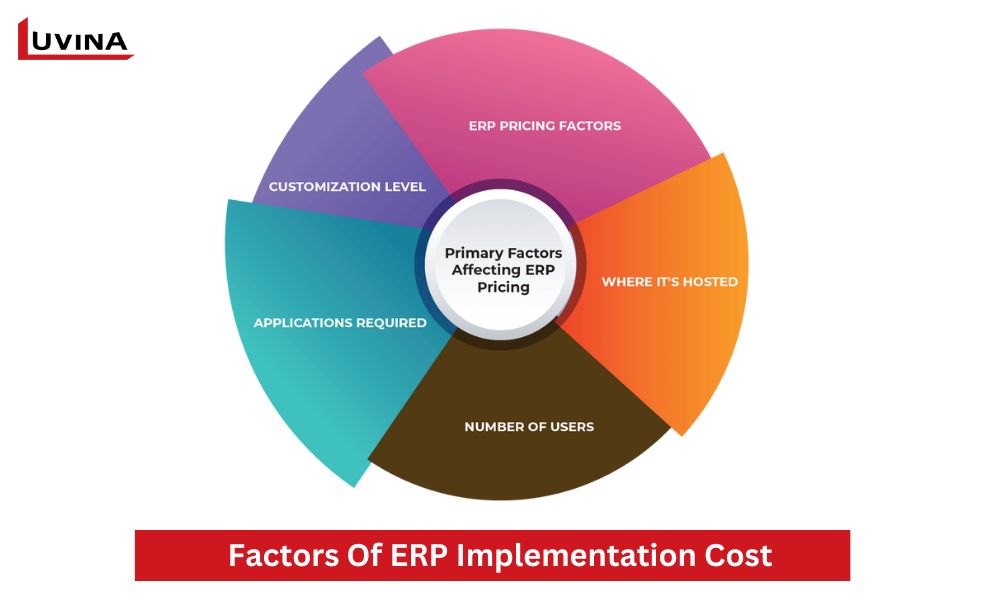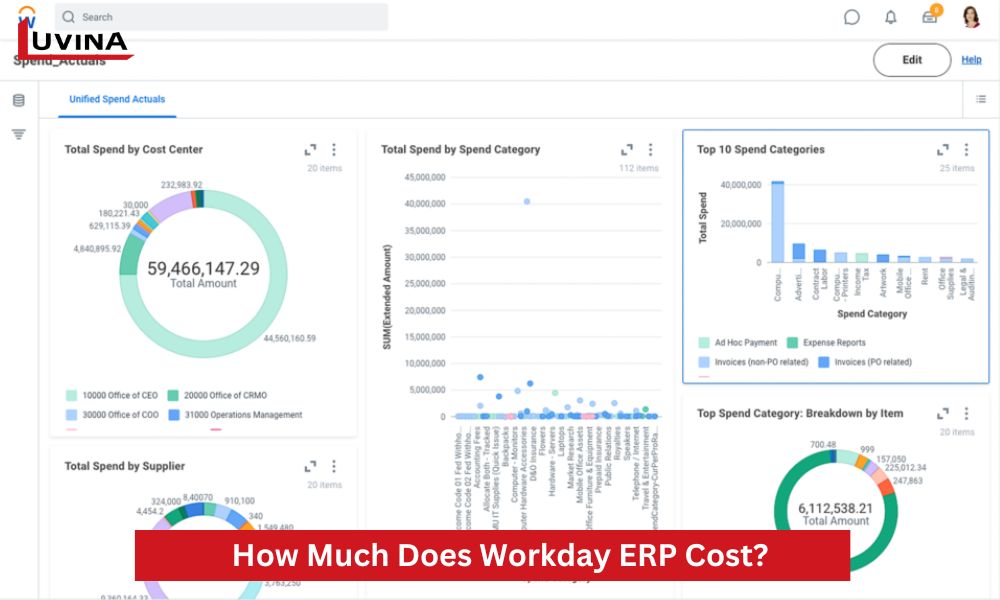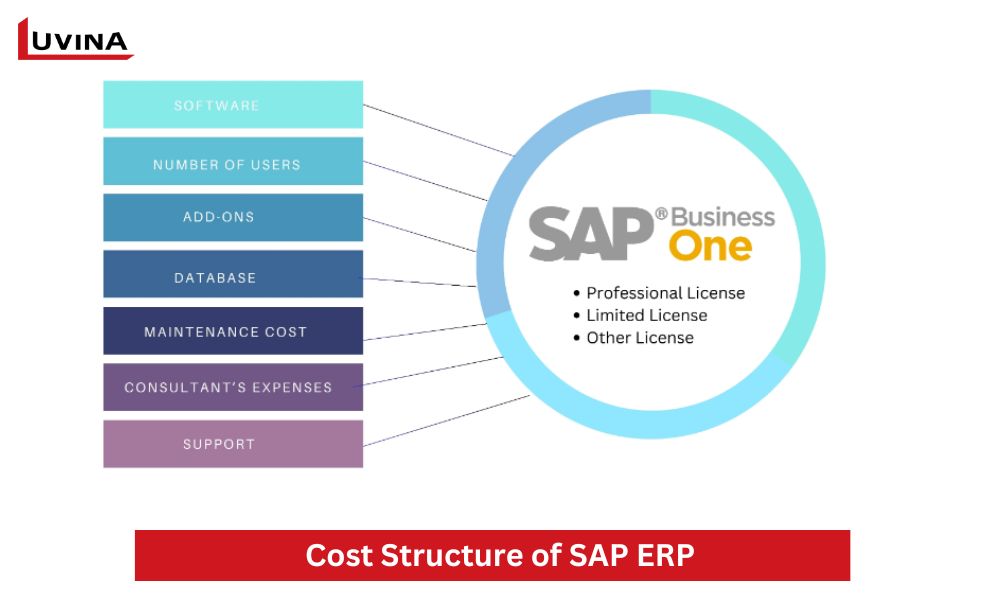Building a centralized management platform like ERP certainly incurs significant costs. It’s very difficult to estimate the exact figure that a business needs to invest because ERP implementation costs depend on many factors. To help you have a clearer picture of the cost landscape, in the following article, let’s explore the average costs and ways to optimize costs when deploying an ERP system.
How Much Does It Cost to Implement an ERP System?
Estimating the cost of implementing an ERP system is difficult for any business. This is because ERP implementation costs depend on many factors. Moreover, ERP solution providers rarely disclose detailed pricing until they receive specific requirements from the business.

According to surveys, platform-based ERP implementation cost breakdown for a medium-sized company can range from $50,000 to $1,000,000, excluding software licensing fees. The specific costs will vary depending on features, customization level, number of users, integration scope, organization structure, and more.
On the other hand, a full-scale customized ERP system for a medium-sized company can cost over $1,000,000 depending on industry requirements, detailed business needs, number of users, and other factors.
Factors Affecting ERP Implementation Cost
The reason there’s no universal price for every ERP system is that ERP implementation costs depend on the following factors:
- System functionality: The more functions an ERP system has, the higher the cost tends to be.
- Customization: Many ERP solution providers charge extra if a business wants additional advanced feature modules not included in the core price. To avoid spending money on unnecessary modules, many businesses today with specific workflows often opt for customized ERP solutions to save costs.
- Number of users: ERP implementation costs typically include fees for each user. Therefore, the more users, the higher the cost.
- Transaction volume: Larger businesses with more users tend to have higher ERP implementation time and costs.
- Scope and integration method: Necessary integrations for smooth ERP system operation with existing solutions a business has will affect ERP implementation costs. While many current solutions can integrate easily through APIs, there are still costs associated with customization and training.

- Training programs: Some providers offer free training programs for basic ERP system features to businesses. However, on-site training for customized ERP systems may incur additional fees.
- Scale, organizational structure: The company’s scale directly affects ERP implementation time and costs. ERP costs also vary by industry, as some industries have more specific requirements and detailed customizations that come with additional fees.
- Experience and methods of ERP system provider: The more reputable and diverse the services offered by the chosen ERP system provider, the higher the fees tend to be. Additionally, the methods they employ for ERP system deployment also impact overall costs.
>> Also read: Best ERP Implementation Strategy
The Cost Breakdown of Leading ERP Systems
The choice of solution significantly impacts ERP implementation costs. In the section below, let’s explore the costs of some top ERP systems to help businesses select the most suitable solution.
1. Microsoft
Microsoft is an ERP system known for its integration capabilities. It not only allows connections with other products within the same operating system but also offers customizable integration through open APIs. With high data security when transferring data between systems, Microsoft is an ideal ERP platform for sensitive data, suitable for industries requiring tight management.
Microsoft’s ERP system currently has an average price of $70 per user per month.
2. Workday
Workday is an ideal SaaS software system for financial management, human resources, project management, and more. Workday’s ERP solutions are widely used for data and business process transformation for enterprises. The majority of Workday’s customers are medium to large-sized companies and organizations.

Workday mainly charges subscription fees on a quarterly or yearly basis. For large-scale companies, the minimum annual cost of implementing an ERP system of Workday is approximately USD 225,000. In addition to software fees, Workday also charges a one-time implementation fee. The implementation fee is equivalent to 125% to 150% of the annual software fee.
However, recently, Workday has made adjustments to its deployment approach targeting the mid-market segment. Not only has the deployment time been shortened, but the implementation fee has also been reduced. Whereas previously the implementation fee ranged from 125% to 150% of the annual software fee, it now ranges from 80% to 110%.
3. NetSuite
NetSuite ERP is a cloud-based business management solution. The breakdown of ERP implementation costs includes 3 components: the core platform, optional modules, and the number of users. Additionally, the cost of NetSuite ERP depends on the version chosen by the business.
- – NetSuite Starter is designed for small companies with one legal entity and up to 50 employees, with a maximum of 10 full-user licenses.
- – NetSuite Mid-Market is for medium-sized companies with two or more legal entities, and 10 to 1000 full-user licenses.
- – NetSuite Enterprise is for enterprises with over 1000 full-user licenses.
The ERP implementation cost of NetSuite also depends on each user, each module, and additional features. This provider does not publish specific pricing tables. Businesses need to contact them for pricing information.
4. Oracle
Oracle ERP is a cloud-based solution that helps businesses of all sizes streamline their business processes. Despite its simplicity, this solution boasts high scalability and full integration, along with a suite of applications that can enhance productivity, reduce costs, and control all business operations.
Oracle currently prices ERP implementation costs based on feature packages with 3 service tiers:
- – Financial Reporting Package: approximately $175 per month
- – Advanced Financial Control Package: around $80 per user per month
- – Advanced Access Control Package: $150 per user per month
5. SAP
If your business is seeking a high-configurable ERP solution tailored to specific industries, then SAP is the appropriate choice. On average, SAP’s ERP solutions have a cost of around $56 per user per month. Although SAP does not publicly list prices for individual product suites, it does publish a pricing structure to help customers partially determine the cost of implementing an ERP system.

The ERP implementation cost of SAP depends on the type of license, modules, organizational scale, and the version of SAP S/4HANA selected.
6. Odoo
Odoo is an open-source ERP solution that helps businesses manage finances, inventory, human resources, and various other business activities. On average, Odoo charges around $24.90 per user per month. The detailed pricing model of this system depends on the service package chosen by the business.
- – Odoo Community Edition: Free but with limited features.
- – Odoo Enterprise Edition: Paid monthly or annually, with costs based on the number of users and the country where the business operates.
With the Odoo Enterprise Edition, companies can choose one of the following options:
- – One App: Free with any Odoo ERP application, with unlimited users.
- – Standard: An Odoo online platform for all applications, priced based on the number of users and the operating region. Costs range from $24.90 per user per month.
- – Custom: Suitable for companies requiring more Odoo customization, with costs starting at $37.40 per user per month.
>> Read more: Explore 10 Best ERP Software
How Can We Reduce ERP Implementation Costs?
To save on ERP implementation costs while ensuring system performance and quality, here are some considerations for you:
1. Negotiate software licensing
Each ERP vendor prices software licenses differently. Therefore, before making a choice, you need to thoroughly research and develop a detailed negotiation strategy to obtain the best possible price. In some cases, you may need to invest more if you want to work with reputable, reliable deployment partners.
2. Carefully choose cloud-based software
Many businesses believe that cloud-based ERP software will help save costs because of lower entrance fees. However, in reality, cloud-based ERP software will incur higher annual fees compared to on-premised ERP solutions, especially if the company has large transaction volumes and user bases.

3. Avoid over-provisioning resources
Businesses should avoid over-provisioning resources, including personnel, for ERP deployment. To do so, the collaboration process must be transparent, with a comprehensive project plan and full documentation.
4. Avoid excessive customization
To reduce ERP implementation costs, you should only customize based on your company’s specific requirements. Over-customizing features can be very expensive and lead to budget overruns. Additionally, customized software solutions often receive fewer updates from the provider. Choose ERP software packages that can meet at least 80% of your required features. Then, you can add a few custom features that the software package doesn’t include.
5. Clearly define the ERP feature set you need
Seek expert assistance in budgeting for ERP projects:
For the most accurate assessment of the cost of implementing an ERP system, you may need the assistance of experts from Luvina. With a team of experienced professionals, Luvina will analyze your business model, propose suitable software deployment scopes, estimate costs and necessary resources, and support the development of either entirely new ERP systems or the customization of existing ones.

Collaborating with Luvina provides an opportunity to access leading ERP solutions such as DynamicAX, Workday, SAP, and Oracle at the most affordable costs. We are committed to providing the highest quality of service to our customers, offering support and assistance 24/7 in both English and Japanese and expanding the scale of our ERP deployment teams according to our customers’ needs.
Contact Luvina now for advice on the optimal implementation ERP solutions for your project at the most affordable cost.
Final Thoughts
Investing in ERP solutions is a worthwhile investment to optimize business operations. To deploy the system effectively, you need to be prepared for all costs and develop an accurate budget allocation plan to ensure the project runs smoothly until the system is fully implemented. Hopefully, the above article has helped you understand the structure of ERP implementation costs and how to optimize expenses.
To learn more about ERP, check out these additional resources:








Read More From Us?
Sign up for our newsletter
Read More From Us?
Sign up for our newsletter